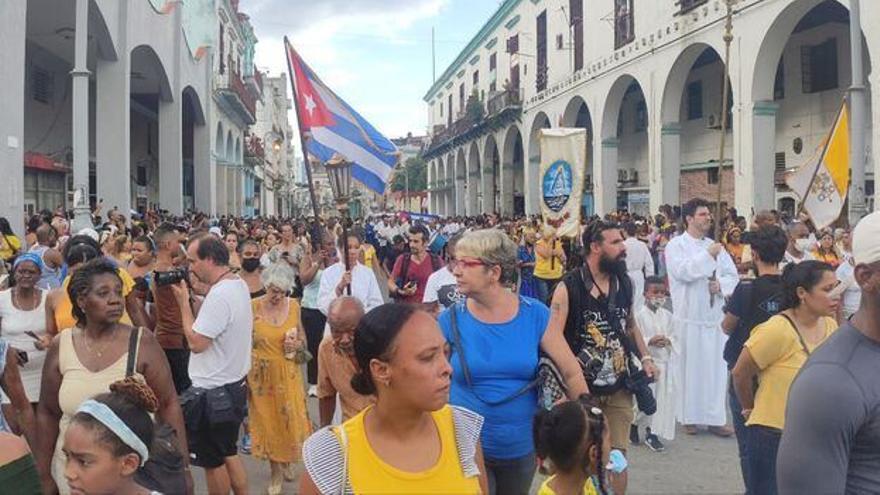
![]() 14ymedio, Havana, 22 June 2023 — The most recent report of the Cuban Observatory of Human Rights (OCDH) on religious freedom alleges that the Island’s religious are more vulnerable to the harassment of the regime because of their “civic position.” Sixty-eight percent of the 1,394 people surveyed by the organization said they knew of cases in which a religious group has been repressed or threatened for its criticism of the Government.
14ymedio, Havana, 22 June 2023 — The most recent report of the Cuban Observatory of Human Rights (OCDH) on religious freedom alleges that the Island’s religious are more vulnerable to the harassment of the regime because of their “civic position.” Sixty-eight percent of the 1,394 people surveyed by the organization said they knew of cases in which a religious group has been repressed or threatened for its criticism of the Government.
The publication of the study, which coincides with the visit of Cuban President Miguel Díaz-Canel to Pope Francis in the Vatican, does not define, however, whether the persecution has to do with the beliefs themselves or whether, on the contrary, it can be attributed to the critical role the religious have played in the Cuban public sphere.
Those interviewed by OCDH reside in 83 municipalities in the 15 provinces of the Island and were surveyed during February of this year. The general conclusion is that the country remains an inhospitable territory in terms of religious freedom. All participants – 45% of them women – are over 18 years old, and the figures have a margin of error of +/- 2.62 points.
Sustaining a critical political stance based on faith is, for 58% of the interviewees, the first cause of harassment by the regime, while 45% believe that “talking publicly about their faith” – including on social networks – can motivate discriminatory treatment.
The report also denounces “concrete actions” against religious institutions and leaders. Sixty-four percent of respondents know of cases in which they have been denied “permits for events in public spaces,” while 63% mentioned the denial or conditioning of permits “to build or repair temples,” and the same percentage, claimed to know of episodes in which the departure of processions was denied or conditioned.
In this sense, the Catholic priest José Luis Pueyo, of the Diocese of Santa Clara, affirms that a distinction must be made between “freedom of worship” and “religious freedom.” In the first case, it is one of the dimensions of religious life, but it does not exhaust it: “There are dimensions such as educational activity, presence in school and university, care for the elderly, sick and needy, communicative activity – press, radio and television – as well as a multitude of civil and associative activities (what is called ’civil society’) that are totally restricted and are monopolized, no longer by the State, but by the Communist Party,” he explains to 14ymedio.
According to Pueyo, it is “curious” that the religious must negotiate with the Party and not with the Government itself. In fact, 68% of those surveyed by the OCDH point to the Office of Religious Affairs, led by Caridad Diego – who was part of the government delegation that visited the Vatican this week – as the agency that promotes the violation of religious freedom. More than half of those consulted know a leader “who has been prevented or hindered from performing his work.”
A section of the study analyzes the “confidence” of Cubans in “national institutions,” concluding that 42% trust religious associations more than official ones. Human rights groups (19%) and independent media (13%) have the same reliability, while the Government enjoys only 13%.
Official institutions such as the Committees for the Defense of the Revolution (CDR), the Federation of Cuban Women (FMC), the Police, the Armed Forces and the courts comprise a devastating 2%. In general, 73% of respondents report that the country “is going in the wrong direction.” The CDRs are, according to 65% of the Cubans consulted, the body through which the Government exercises supervision over the religious.
The OCDH also states that the regime promotes “surveillance and control” over the religious for sustaining a “civic commitment in accordance with the values of their faith.” In addition, the Government limits the “action and social influence of religious entities and congregations, especially those that demand a greater presence in public space and in the communities.”
The United States included Cuba in 2022 on the blacklist of countries that violate religious freedom, along with Nicaragua, China, Saudi Arabia, North Korea, Russia, Iran, Pakistan, Burma, Eritrea, Tajikistan and Turkmenistan. The Government of the Island responded with a campaign that involved like-minded religious leaders, such as members of the ruling Council of Churches, the Yoruba Cultural Association, the Islamic League of Cuba and the Cabildo Quisicuaba cultural project. Enrique Alemán, director of Quisicuaba, defended the Cuban State, saying that it “recognizes, respects and guarantees” all religions, but he avoided alluding to the critical stance of many of its leaders.
During the summer of that same year, a report by Prisoners Defenders, based in Madrid, showed that since 1959 the regime has organized an espionage network to infiltrate numerous agents in churches and also in fraternities such as Freemasonry.
In the case of the latter association, its national Grand Master, Francisco Alonso Vidal, had to escape from the Island after the sustained harassment of State Security. The Freemason then denounced the systematic infiltration of Cuban counterintelligence, with the aim of monitoring and influencing the decisions of all fraternal and religious institutions on the Island.
Translated by Regina Anavy
____________
COLLABORATE WITH OUR WORK: The 14ymedio team is committed to practicing serious journalism that reflects Cuba’s reality in all its depth. Thank you for joining us on this long journey. We invite you to continue supporting us by becoming a member of 14ymedio now. Together we can continue transforming journalism in Cuba.
